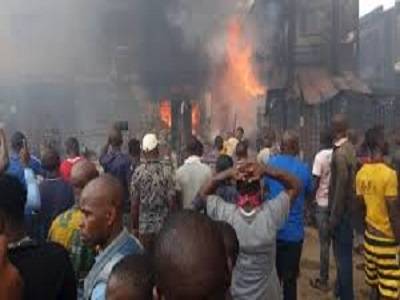Increase in Fire Incidents in Ashanti Region
The Ashanti Region has witnessed a worrying surge in fire incidents in recent months, sparking widespread concern among residents, business owners, and local authorities. As the flames consume properties and disrupt lives, the need for immediate and sustainable solutions has never been more pressing.
Reports indicate that these fires have affected residential areas, marketplaces, and public spaces. Key hotspots include the Kumasi Central Market and various densely populated neighborhoods, where improper electrical wiring, open flames, and flammable materials have contributed to the disasters. In some cases, delayed responses from the Ghana National Fire Service (GNFS) have exacerbated the damage, leaving affected families and businesses struggling to recover.
This alarming trend raises questions about safety protocols and public awareness. Many incidents could have been avoided with better precautionary measures. Faulty electrical connections, indiscriminate burning of waste, and the lack of fire extinguishers in homes and workplaces have all played a role in escalating the problem. Additionally, the dry season and Harmattan winds are further fueling these fires, intensifying the destruction.
To address this crisis, immediate and long-term interventions are essential. Public education campaigns on fire safety must be prioritized. Schools, churches, and local radio stations can serve as platforms to educate residents about the dangers of open flames, overloading electrical circuits, and unsafe handling of flammable materials.
The Ghana National Fire Service must also strengthen its preparedness and response mechanisms. Investing in modern fire-fighting equipment, improving water supply systems in fire-prone areas, and establishing more fire stations in underserved communities can significantly reduce response times. Authorities must also conduct routine inspections of public places to ensure adherence to fire safety standards.
Furthermore, the government should consider subsidizing fire safety tools such as smoke detectors and extinguishers for low-income households. Market traders, often the hardest hit, should be trained on how to minimize fire risks and respond effectively during emergencies.
While these measures are promising, their success will depend on collective responsibility. Community members must actively participate in fire prevention efforts and promptly report fire hazards.
As we grapple with this challenge, let’s recognize that every fire incident represents a loss that could have been prevented. The Ashanti Region’s resilience depends on a united approach to tackling this growing menace.
For more updates on this developing story and actionable safety tips, follow us. Together, we can protect lives and properties from the devastating impact of fires.




No comments yet
Be the first to share your thoughts!